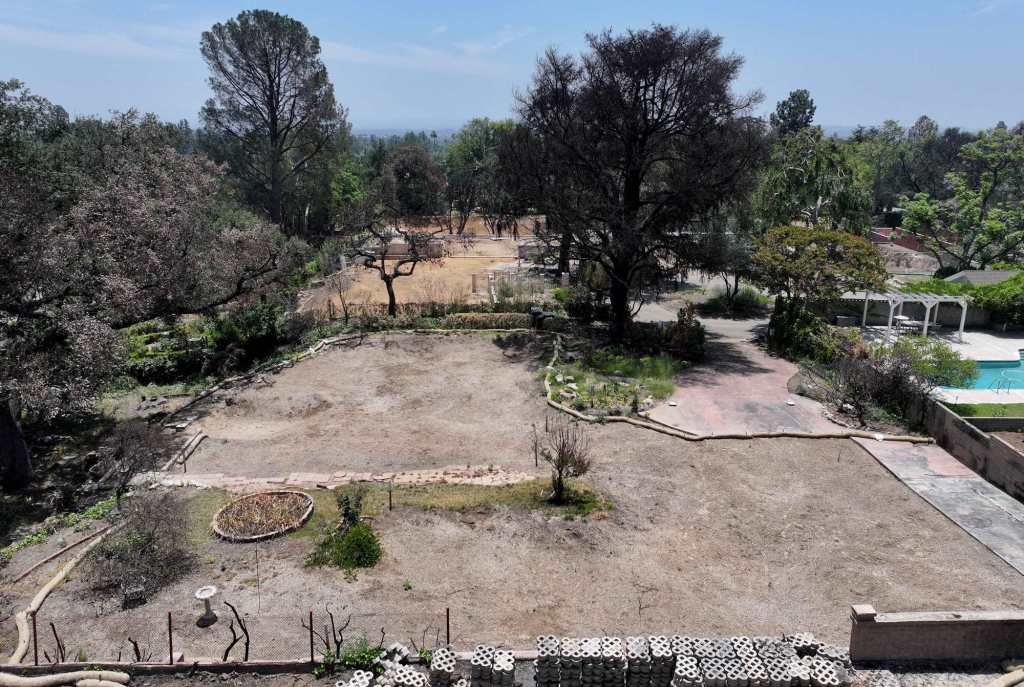Edwin Castro’s $2.04 Billion Power Play: From Lottery Winner to Community Investor
On a seemingly ordinary day in Altadena, California, the hum of a gas station was broken by an extraordinary event—a $2.04 billion Powerball jackpot claimed by Edwin Castro in November 2022. Since then, Castro has largely remained in the shadows, shying away from fame despite being the largest lottery winner in history. However, in a remarkable turn of events, he is now emerging as a pivotal figure in his community, plowing nearly $9 million into a series of burned-out homesites in the wake of devastating wildfires that impacted the region.
“They love and care about the Altadena community and saw an opportunity to invest in it,” a publicist for Castro stated. In recent months, the company he co-founded, Black Lion Properties LLC, has become the largest land investor in the Los Angeles County fire zones, purchasing at least a dozen properties. This initiative is not just a business venture; it’s framed as an effort to help rebuild a community that many local residents are eager to move beyond due to the trauma of loss.
A Community in Ashes
The fires that ravaged Altadena and nearby Pacific Palisades last year left behind a haunting landscape, with charred remains of homes still visible amid the thick brush. According to recent data, the Castro brothers are among 145 buyers of at least 221 homesites that have changed hands since. The sentiment among displaced homeowners is mixed; many are both traumatized and keen to start afresh.
- “Many people who were affected by the fires cannot or do not want to rebuild and aspire to move on and start over elsewhere,” the Castro brothers noted in their statement.
- “People who are 75-plus are sort of thinking if this takes four years, is this what I want to do with these four years? Probably not,” said Teresa Fuller, a real estate agent and Altadena resident.
- “It feels like a bit of a land rush. But frankly, the number of developers who can come in and buy lots is a tiny drop in the bucket of the houses that need to get rebuilt,” noted Brock Harris, a prominent Los Angeles broker.
The Castro brothers are uniquely positioned to navigate this complex landscape; they understand the local culture and ethos. Edwin Castro, a lifelong resident of Altadena, has invested not merely capital but also a potent blend of aspirations for a revitalized neighborhood. Their mission aims to ask the community not just to survive, but to thrive.
From Ashes to New Beginnings
The fires have prompted a unique intersection between tragedy and opportunity. Recent data suggests an active real estate market in the area, with 364 lots still either in escrow or up for sale. Although these lots represent only 6% of all homes lost, they symbolize a larger trend that may reshape Altadena into a new, revived neighborhood.
Nonetheless, some homeowners—like Richard Korngute, whose home was lost—see only emptiness. “With the state of the Palisades and the total destruction up there… we didn’t really want to be living anywhere near that for the rest of our days,” he reflected. For many, the decision to sell comes not simply from financial considerations but from an emotional desire to escape painful memories.
Investment Meets Community Resilience
The partnership between Castro and his brother Jesse is seen as a pivotal opportunity for Altadena. Local residents are cautiously optimistic about the brothers’ plans to restore at least half the homes that were on the lots they purchased. “We expect to use pre-existing plans for half of the lots, with newly designed single-family homes on the remaining lots,” the publicist conveyed. Such endeavors are not without scrutiny, however; local residents have organized to prevent outside investors from distorting their beloved neighborhood.
“Altadena is Not for Sale” has become a rallying cry for some residents who wish to preserve the character of their community amid rising land values and influxes of investors. What remains to be seen is how the brothers’ efforts might balance both the community’s pulse and the market’s appetite.
Data Trends and Economic Implications
According to a recent report by the Southern California News Group, Altadena had more than twice as many lot sales compared to Pacific Palisades, driven largely by the affordability of parcels in the area. The average sale price in Altadena has been just under $663,000, while properties in Pacific Palisades command over $2.5 million. Thus, Altadena emerges as a nexus for both rehabilitation and investment.
Yet, as demand surges, so do the prices. “Sales peaked in April, with agents claiming that bidding wars were common, but as more inventory hits the market, we’re witnessing a downward pressure on pricing,” noted agent Dan Urbach.
Investors in the region are eyeing the potential for redevelopment with renewed vigor. One buyer plans to add accessory dwelling units (ADUs) or even convert existing properties into condos. The state’s recent legislative measures aimed at increasing housing density may further accelerate these trends, posing both opportunities and challenges for the area.
“Many homeowners now face the choice to either rebuild—often at exorbitant costs—or sell their lots to investors who promise to revitalize the area,” noted urban development expert Dr. Jane Wilkins. “How residents navigate this choice will define Altadena’s future for years to come.”
Against this backdrop of economic upheaval and environmental devastation, Edwin Castro’s investments emerge as a double-edged sword. Will his financial contributions restore the community’s spirit and stabilize its economy, or will they signal the influx of corporate interests that could dilute the very essence of Altadena?
Whatever the outcome, Edwin Castro’s presence marks a significant moment in the evolution of a community grappling with loss while also seeking renewal. As the ashes cool and new foundations are laid, the collective future of Altadena remains an open question, one that encapsulates both hope and uncertainty.









